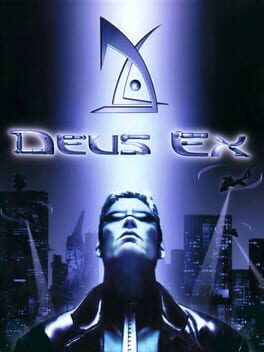Hong Kong is one of the best levels I've ever encountered in any game, ever.
The rest of Deus Ex is all just as strong, too.
My non-lethal run started out as a teeth-pulling, save-scumming stealth game (still fun, even if a bit basic and slow as such) and gradually evolved into ballistic-armoring, speed-boosting, and occasionally straight up invis-walking past enemies. The progression that the augmentations afford is incredible and empowering, but never so strong that one approach feels obviously superior--a tough proposition even among the best immersive sims. Admittedly, if you're not feeling creative, some newer Arkane games occasionally run into this thanks to the omnipresent strength of blinking around. System Shock 2, while a master class in atmosphere, doesn't really have that many viable playstyles. Thief is an incredible stealth game, and I love it for that, but Deus Ex director Warren Spector had bigger ideas: he wished you didn't have to play Thief as a stealth game in the first place. Deus Ex is the first great, even masterful execution of that idea.
Another thing that is striking about Deus Ex, even to this day: almost all of the meaningful choices in the game, where possible, are presented through mechanics, systems, and open-ended situations rather than menus, text boxes, or button prompts. Want to kill or spare a character? Just do it. (It might not be easy, but that only makes it more immersive.) Want to avoid learning the passcode to this door? Stack some boxes to climb into the window. Or do whatever else you want. Only you can judge yourself. Try to stick to the approach you feel is right, or experiment wildly. It's all here. It's all tight, atmospheric, and--as clunky as the stealth, shooting, and AI can seem--it all works together as a brilliant clockwork contraption of mechanics, simulation, and downright satisfying game design.
0451/10
The rest of Deus Ex is all just as strong, too.
My non-lethal run started out as a teeth-pulling, save-scumming stealth game (still fun, even if a bit basic and slow as such) and gradually evolved into ballistic-armoring, speed-boosting, and occasionally straight up invis-walking past enemies. The progression that the augmentations afford is incredible and empowering, but never so strong that one approach feels obviously superior--a tough proposition even among the best immersive sims. Admittedly, if you're not feeling creative, some newer Arkane games occasionally run into this thanks to the omnipresent strength of blinking around. System Shock 2, while a master class in atmosphere, doesn't really have that many viable playstyles. Thief is an incredible stealth game, and I love it for that, but Deus Ex director Warren Spector had bigger ideas: he wished you didn't have to play Thief as a stealth game in the first place. Deus Ex is the first great, even masterful execution of that idea.
Another thing that is striking about Deus Ex, even to this day: almost all of the meaningful choices in the game, where possible, are presented through mechanics, systems, and open-ended situations rather than menus, text boxes, or button prompts. Want to kill or spare a character? Just do it. (It might not be easy, but that only makes it more immersive.) Want to avoid learning the passcode to this door? Stack some boxes to climb into the window. Or do whatever else you want. Only you can judge yourself. Try to stick to the approach you feel is right, or experiment wildly. It's all here. It's all tight, atmospheric, and--as clunky as the stealth, shooting, and AI can seem--it all works together as a brilliant clockwork contraption of mechanics, simulation, and downright satisfying game design.
0451/10
